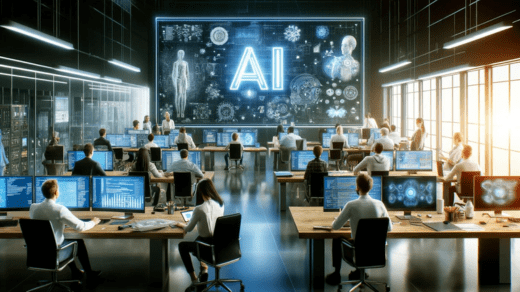
ai software development services
Artificial Intelligence (AI) has revolutionized various industries by offering innovative solutions to complex problems. One of the key areas where AI is making a significant impact is software development. AI software development services leverage advanced algorithms and techniques to create intelligent applications that can automate tasks, analyze data, and provide valuable insights. In this article, we’ll explore the world of ai software development services, its components, benefits, challenges, best practices, and future trends.
Introduction to AI Software Development Services
AI software development services encompass the process of designing, building, and deploying software applications that integrate artificial intelligence technologies. These services cater to a wide range of industries, including healthcare, finance, retail, automotive, and more. With AI, businesses can develop intelligent applications capable of understanding, reasoning, learning, and interacting with users in a natural and human-like manner.
Understanding AI Software Development
What is AI Software Development?
AI software development involves the use of machine learning algorithms, natural language processing (NLP), computer vision, and other AI techniques to create intelligent software applications. These applications can perform tasks such as data analysis, image recognition, language translation, and decision-making without human intervention.
Importance of AI in Software Development
AI plays a crucial role in software development by enabling developers to build intelligent applications that can automate repetitive tasks, optimize processes, and deliver personalized experiences to users. By leveraging AI technologies, businesses can gain a competitive edge and drive innovation in their respective industries.
Key Components of AI Software Development Services
AI software development services consist of several key components, including:
Machine Learning
Machine learning is a subset of AI that focuses on developing algorithms capable of learning from data and making predictions or decisions. It involves techniques such as supervised learning, unsupervised learning, and reinforcement learning to train models and extract valuable insights from large datasets.
Natural Language Processing (NLP)
Natural language processing enables computers to understand, interpret, and generate human language. NLP algorithms analyze text, speech, and other forms of natural language data to extract meaning, sentiment, and intent. Applications of NLP include chatbots, virtual assistants, sentiment analysis, and language translation.
Computer Vision
Computer vision enables computers to interpret and analyze visual information from images or videos. It involves techniques such as image recognition, object detection, and image segmentation to identify patterns, objects, and features within visual data. Applications of computer vision include facial recognition, autonomous vehicles, medical imaging, and surveillance systems.
Advantages of Using AI Software Development Services
AI software development services offer numerous benefits to businesses, including:
Enhanced Efficiency and Accuracy
AI-powered applications can automate repetitive tasks, streamline processes, and eliminate human errors, leading to improved efficiency and accuracy in operations.
Cost Reduction
By automating tasks and optimizing workflows, AI software development services help businesses reduce labor costs, minimize resource wastage, and achieve higher returns on investment.
Personalized User Experience
AI enables businesses to analyze user data, preferences, and behaviors to deliver personalized recommendations, content, and experiences, thereby enhancing customer satisfaction and loyalty.
Industries Benefiting from AI Software Development
AI software development services have transformed various industries, including:
Healthcare
In healthcare, AI applications are used for medical imaging analysis, disease diagnosis, drug discovery, patient monitoring, and personalized treatment planning.
Finance
In finance, AI-powered algorithms are utilized for fraud detection, risk assessment, algorithmic trading, customer service automation, and personalized financial advice.
Retail
In retail, AI enables businesses to optimize inventory management, analyze customer data, personalize marketing campaigns, and enhance the shopping experience through virtual assistants and recommendation systems.
Automotive
In the automotive industry, AI is employed for autonomous driving, predictive maintenance, vehicle diagnostics, smart navigation, and driver assistance systems.
Challenges in AI Software Development
Despite its numerous benefits, AI software development comes with its own set of challenges, including:
Data Privacy and Security
AI applications rely on large volumes of data, raising concerns about data privacy, security, and ethical use. Businesses must implement robust data protection measures and comply with regulations to safeguard sensitive information.
Ethical Concerns
The use of AI in decision-making processes raises ethical concerns related to bias, fairness, transparency, and accountability. Developers must ensure that AI systems are ethical, unbiased, and accountable for their actions.
Integration Issues
Integrating AI into existing software systems and infrastructure can be challenging due to compatibility issues, interoperability issues, and technical complexities. Businesses must carefully plan and execute the integration process to avoid disruptions and inefficiencies.
Best Practices in AI Software Development
To overcome the challenges associated with AI software development, businesses should follow best practices such as:
Robust Data Management
Effective data management is essential for AI software development, including data collection, preprocessing, labeling, augmentation, and quality assurance. Businesses must ensure that data is accurate, relevant, and representative to train reliable AI models.
Ethical AI Implementation
Businesses should adopt ethical principles and guidelines for the responsible development and deployment of AI systems. This includes promoting fairness, transparency, accountability, and human oversight in AI-driven decision-making processes.
Continuous Learning and Improvement
AI systems should be designed to continuously learn and adapt to new data, feedback, and environmental changes. Businesses should invest in ongoing training, monitoring, and optimization to ensure that AI models remain accurate, reliable, and up-to-date.
Choosing the Right AI Software Development Service Provider
When selecting an AI software development service provider, businesses should consider the following factors:
Expertise and Experience
Look for a service provider with expertise in AI technologies, domain knowledge, and industry experience relevant to your business needs.
Portfolio and Case Studies
Review the provider’s portfolio, case studies, and client testimonials to assess their track record of delivering successful AI projects and solutions.
Client Testimonials and Reviews
Seek feedback from past clients and references to gauge the provider’s reputation, reliability, and customer satisfaction levels.
Future Trends in AI Software Development
The future of AI software development is marked by several emerging trends, including:
AI-driven Automation
AI-powered automation will continue to revolutionize industries by enabling autonomous systems, intelligent robotics, and self-learning algorithms to perform tasks traditionally done by humans.
Edge Computing
Edge computing, which involves processing data closer to the source of generation, will become increasingly important for AI applications that require real-time processing, low latency, and bandwidth efficiency.
Explainable AI (XAI)
Explainable AI aims to make AI systems more transparent, interpretable, and understandable by providing insights into how decisions are made and why certain outcomes are predicted.
Conclusion
AI software development services have become indispensable for businesses looking to leverage the power of artificial intelligence to drive innovation, efficiency, and growth. By understanding the key components, benefits, challenges, best practices, and future trends in AI software development, businesses can make informed decisions and unlock the full potential of AI to transform industries.






